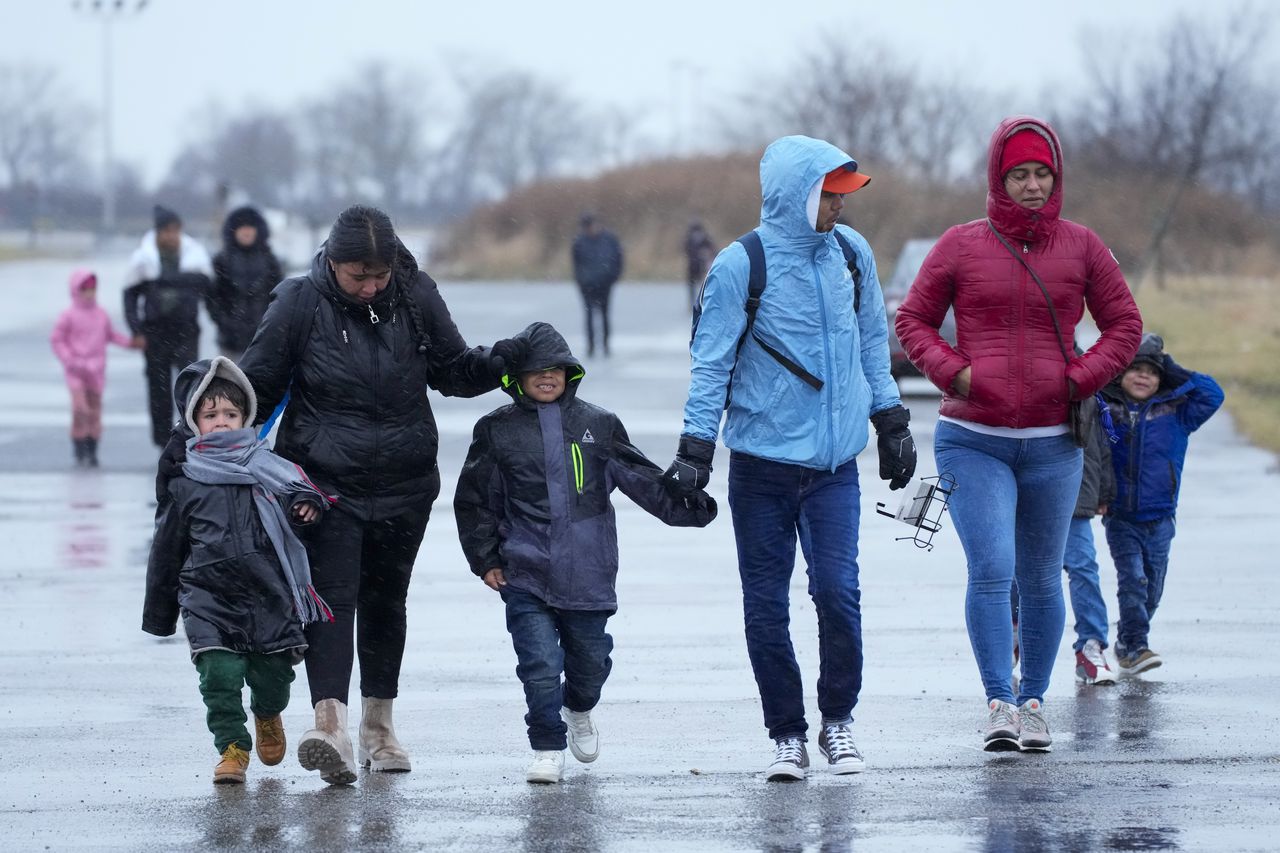New York City migrant refugees to be evicted from shelters after 60-day stay limit
New York City’s 60-day shelter stay limit goes into effect this week amid outcry from advocates who say migrants will now have to navigate a complicated system in the middle of winter to find a safe place to stay.
The New York Immigration Coalition (NYIC) and its allies held a rally on Monday, protesting the shelter limits one day before the rule’s implementation. Demonstrators chanted, “We are here in love” and “We will not throw people out of shelters.” Officials said 4,400 families received 60-day notices.
City officials announced in October that migrant families would need to leave shelters after 60 days in an attempt to speed up the resettlement process and reduce the strain on emergency services. The city said then it was “full and past its breaking point” due to an “unsustainable” spike of migrants in recent years.
“New York City is facing a humanitarian disaster that demands real solutions, not policies like the 60 Day Rule, which harasses families and forces them out of shelter every two months, rips children from their schools, disconnects asylum seekers from the support networks they’ve built and pushes them onto the streets — all during the coldest months of the year,” said Christine C. Quinn, the president and CEO of New York City’s largest shelter for families, Win.
Dr. Ted Long, the senior vice president of population health at NYC Health + Hospitals, said during a press conference Monday that the stay limit is “not just” the amount of time given to a family before they need to move out, but is also a deadline for authorities to identify possible barriers that prevent migrants from finding a stable home. Officials said families facing evictions would be provided “intensified casework services” to find alternative housing before they are removed.
Since August 2022, New York City has welcomed about 126,700 refugees. Last year, Texas Gov. Greg Abbott sent more than 33,600 migrants to New York City. By October, 64,100 asylum seekers were still in the city’s care, with thousands more arriving each week.
Deputy Mayor Anne Williams‑Isom on Monday said New York City officials “want to do what our sister cities are doing” to address the high numbers of new arrivals. She said Chicago, Denver and Massachusetts have already implemented time limits at their shelters to move people quicker.
“We’re running out of space, we’re running out of personnel and we certainly are running out of funds, and so we really have to move from an emergency to managing this in the way that makes sense,” she said.
Advocates said the 60-day notice would have evicted families around Christmas, but Mayor Eric Adams’s administration postponed the expected start date to Jan. 9. A 30-day limit was enacted in November for single adults in shelters, leading to long lines of people waiting in the cold to reapply for a place to stay, according to the NYIC.
The coalition said the shelter limits will displace families, causing major disruptions for children attending New York City schools.
“These children were just able to settle down in schools, parents were able to seek work all because of the small modicum of stability shelter provided as they worked to get on their feet,” said Comptroller Brad Lander in a statement. “City Hall must reverse its 60-day shelter policy, one of the cruelest policies in generations, in the greatest immigrant city the world has ever known.”
New York City Comptroller Brad Lander on Tuesday announced an investigation into the “poorly communicated” 60-day rule to review the plan’s process, how case management resources are being distributed and the social effects and financial impacts of the policies.
Officials will investigate if evictions and shelter relocations impact migrants’ immigration status or their ability to obtain work permits. The comptroller’s office requested a response from Adams by Jan. 15 and asked to receive information from the city by Jan. 22. Lander also asked for weekly updates beginning in late January.
Long said about 40 families with children at the Row Hotel checked out on Tuesday. He said the families met with case workers to determine their next destination.
The city will prioritize placing remaining families with small children in Manhattan, where they’d ideally stay in a hotel near their school, Long added.
“This is not going to be a city where we’re going to place children and families on the street,” Adams said. He said New York City has helped “normalize and stabilize” about 57 percent of people who go through the shelter system. Officials did not comment on how long it takes for migrants to access stable housing.
Advocates say the 60-day rule puts unneeded stress on families and puts them at risk of homelessness in direct opposition to New York City’s right to shelter order, which was enacted in 1979.
“The City’s Right to Shelter mandate keeps tens of thousands of people — men, women and children — from sleeping out on the street. It is that simple,” said New York City Councilmember Sandy Nurse in a statement. “And while shelters will never be the solution to homelessness, we must defend the right to shelter both as a legal right and moral obligation.”
Migrant advocates called for politicians to develop permanent pathways to housing, enhance legal services and remove obstacles to obtaining a bed and shelter.
The eviction notices come days after New York City announced a lawsuit against Texas charter bus companies seeking $708 million to cover the cost of caring for migrants sent from the southern border.
